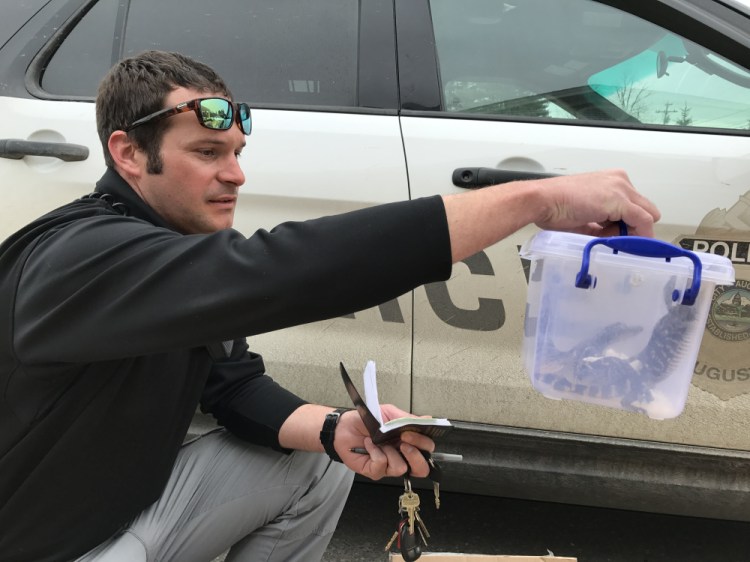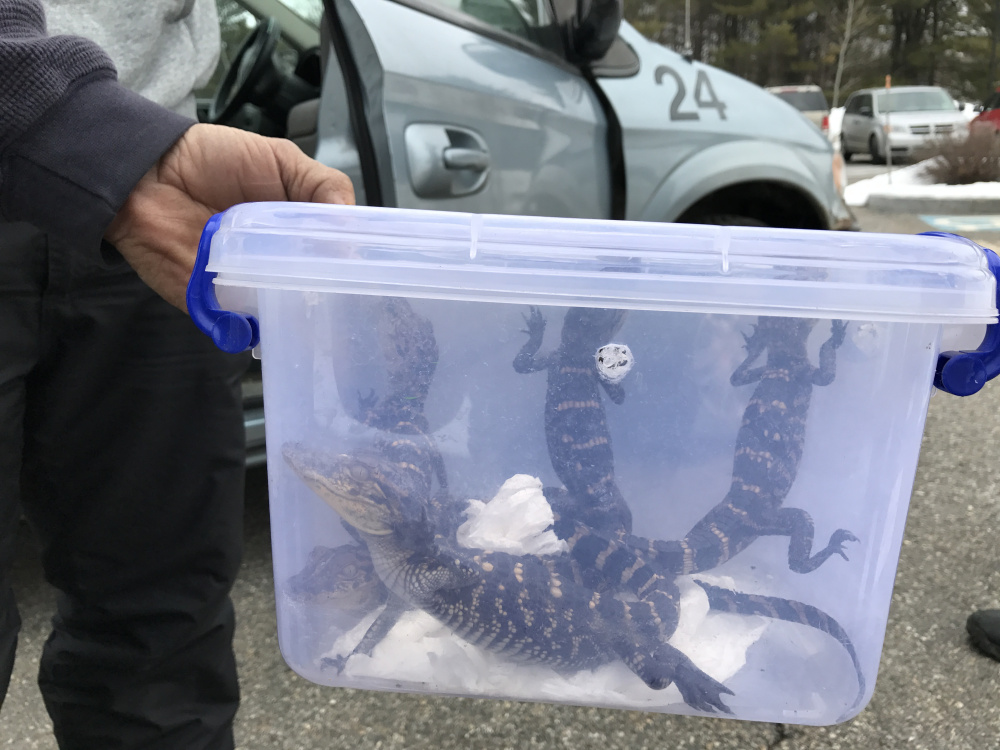Imagine for a moment that several different animals are standing in a row, and you need to pick the most dangerous. In the lineup are a shiny green insect, a crab smaller than a human hand, a turtle with bright red lines running down its temples, and a mature American alligator.
The alligator might seem like the obvious choice. It can weigh up to 1,000 pounds, its mouth is lined with small daggers and its jaws can snap shut with a force of 3,000 pounds per square inch. That physical danger is one of the reasons police seized the five baby alligators they discovered Tuesday afternoon in Augusta.
“In this case they were pretty small,” said Nate Webb, a biologist at the Maine Department of Inland Fisheries & Wildlife, on Wednesday. “But they grow pretty rapidly and certainly are quite difficult to manage as they get some size.”
Police located the alligators in a taxi that had just arrived at the Concord Coach Lines bus station in Augusta. They were being kept in a plastic box, and their alleged owner, 20-year-old Yifan Sun, told police that he was taking a bus to Waterville to show them to his friend. Sun also said he was planning to ship the alligators to someone in Texas.
The officers seized the animals and charged Sun with importing or possessing wildlife without a permit. The young reptiles then were taken to a regional office of the Maine Department of Inland Fisheries & Wildlife in Sidney.
But as alarming as the presence of alligators may be to Maine residents, the overall threat to Maine’s environment from large, exotic reptiles is relatively low compared to the attention they receive.
In the animal kingdom, the greater threats to Maine’s woods and waterways are invasive species such as the green crab, the emerald ash borer and the red-eared slider turtle. However diminutive those species might look next to the fearsome alligator, they actually can survive in the outdoors here. Alligators, on the other hand, naturally occur in the southeastern United States and could not survive these northern climes.
“It’s very unlikely (alligators) could become established in the wild in Maine, just because of the climate here, versus where they’re from naturally,” Webb said.
A combination of state, federal and independent agencies is trying constantly to root out and contain the damage from invasive species that are already here while also looking out for the next ones. After all, those new species sometimes can cut into some of Maine’s major industries.
Originally from Europe, green crabs reached American shores in the mid-1800s and have increased dramatically off Maine’s shores in recent years, feeding on blue mussels and soft-shell clams and threatening the state’s fisheries, according to the Maine Department of Marine Resources.
Other species that have gained a foothold in Maine’s great outdoors, according to Webb, are red-eared slider turtles — which commonly are sold as a pets, but which either have escaped or have been released in some areas — and northern pike, a fish that has been introduced in lakes here.
Northern pike have “completely restructured the fish community in those lakes,” Webb said. “They changed it from more of a cold-water, salmon-and-trout system to one that’s dominated by pike and some other warm-water species. It’s something people probably don’t often think about because it’s a sport fish as well, and people like to catch them, but they’re not actually native in a lot of the locations where they are in the state.”
Wildlife officials are also on the lookout for the emerald ash borer, an insect that feeds on ash trees and has decimated some forestland in New Hampshire, Webb said.
“The stakes are pretty high, and for us it’s all about prevention,” Webb said. “Whether it’s a reptile or an amphibian or a bird or a fish, trying to prevent those species from becoming established either by preventing the importation in general or just being very careful about who’s allowed to import them.”
Charles Eichacker — 621-5642
Twitter: @ceichacker
Send questions/comments to the editors.





Success. Please wait for the page to reload. If the page does not reload within 5 seconds, please refresh the page.
Enter your email and password to access comments.
Hi, to comment on stories you must . This profile is in addition to your subscription and website login.
Already have a commenting profile? .
Invalid username/password.
Please check your email to confirm and complete your registration.
Only subscribers are eligible to post comments. Please subscribe or login first for digital access. Here’s why.
Use the form below to reset your password. When you've submitted your account email, we will send an email with a reset code.